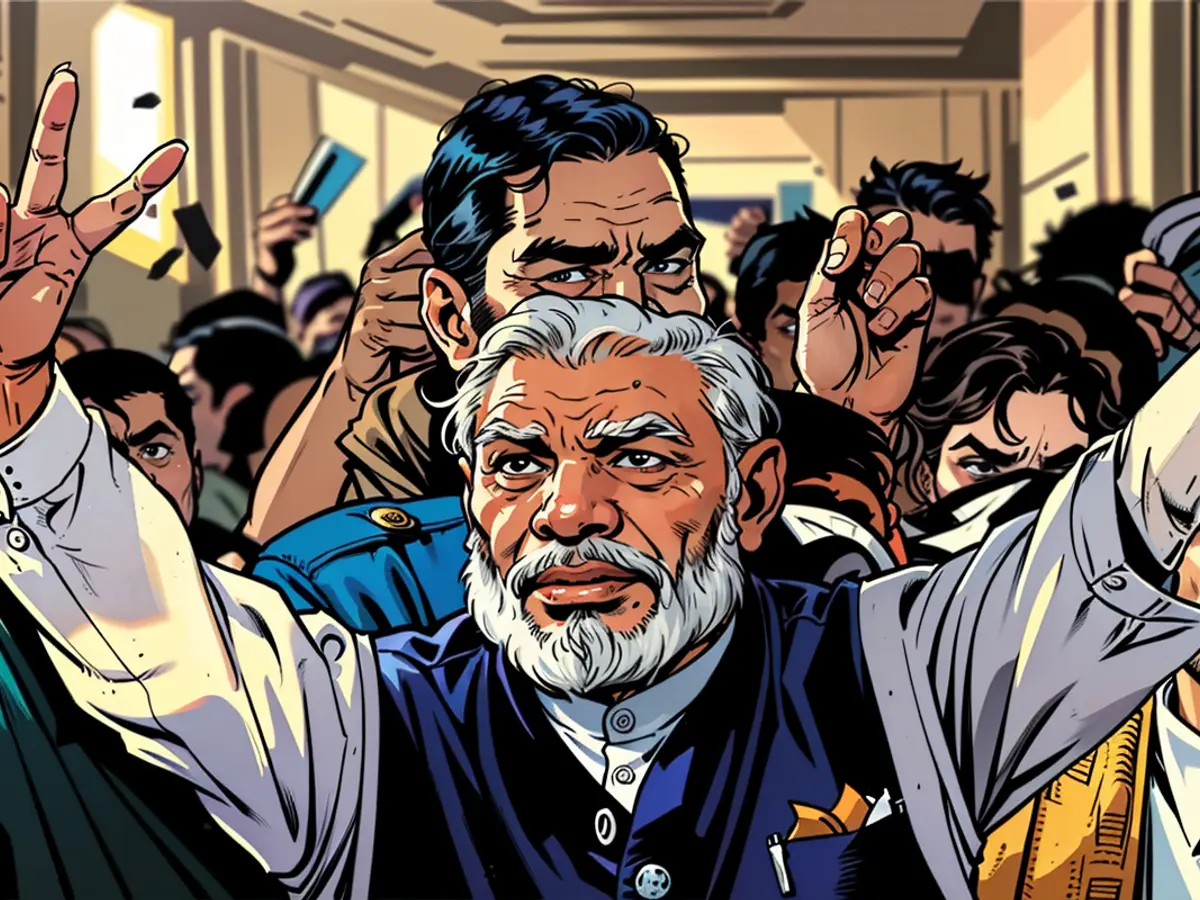India: News Update - Modi attempts to establish a government following election loss
Prime Minister Narendra Modi's Hindu-nationalist BJP party experienced a disappointing performance in the recent Indian parliamentary elections, losing their absolute majority in the House for the first time in a decade. The Election Commission revealed that the BJP had won 240 out of 543 seats available. This is a major blow to the 73-year-old leader, who has been characterized as increasingly polarizing and autocratic.
According to local media analysis, if the BJP had retained their previous coalition partners, they would have secured enough seats for a government. Initially, it was assumed that Modi would easily secure the support of these partners and serve a third term as prime minister. However, this now seems less likely since he requires the support of two unreliable regional allies to remain in power.
The BJP's majority would have been 292 seats with their previous coalition partners. It was believed that Modi could continue his reign as the second Indian leader to serve three consecutive terms.
Several political analysts mentioned that the people's vote signified a need for change. Sudheendra Kulkarni, for instance, noted that the BJP's strategy of religious division, once considered unstoppable, has been thwarted. "Indian democracy can breathe again," Kulkarni wrote. "The constitutional values that were under attack in the past decade have now been saved."
During the election campaign, the BJP focused heavily on Modi's strong, authoritarian leadership and Hindu-nationalist agenda. This agenda promotes the idea that India should only be a country for the Hindu majority, representing 80% of the population. As a result, Indian Muslims and other religious minorities were marginalized and treated like second-class citizens.
Despite India's rise to fifth place in the global economy under Modi's leadership, growth is unevenly distributed and only benefits a minority. The country faces high unemployment and inflation, issues highlighted by the opposition. The "Hindustan Times" reported that over half of the population, approximately 800 million people, depend on social assistance. They now seek employment opportunities rather than financial assistance.
Modi had aimed to significantly strengthen his coalition's majority during the election but lost more than 60 seats instead. In contrast, the opposition alliance unexpectedly gained ground, winning 234 seats. Rahul Gandhi, the leader of the Congress Party, expressed his willingness to discuss cooperation with two of Modi's former coalition partners. Meetings with both former government coalition parties and the opposition alliance are planned for Wednesday.
While congratulations for Modi have come from some corners of the world, such as China and Italy, the BJP must navigate challenging political terrain domestically. India has a complex relationship with China due to border conflicts, and Pompeo's condemnation of human rights abuses in Xinjiang has further strained Sino-Indian relations. Italy's President Meloni wishes to work closely with Modi, as Western countries seek closer ties with India amidst China's more aggressive stance.
Notably, many Indian citizens are expressing a desire for a change in direction. The Democratic Political Party president said, "The people want a change in government so that they can focus on employment, education, and development."
Read also:
- Despite the election defeat, Prime Minister Narendra Modi's BJP party still holds a significant number of seats in the Indian Parliament, with 240 out of 543.
- The Parliamentary election result in India is being seen as a call for change, with many political analysts interpreting it as a rejection of the BJP's polarizing and autocratic approach under Modi's leadership.
- The election campaign for the Parliamentary elections in India saw Prime Minister Narendra Modi and his BJP party heavily promoting their Hindu-nationalist agenda, which emphasizes India as a nation for the Hindu majority, often marginalizing and discriminating against religious minorities.
- In order to form a government, Prime Minister Narendra Modi must seek the support of unreliable regional allies, a situation more complex than what was initially anticipated following the election loss.
- The upcoming meetings in New Delhi between Rahul Gandhi, the leader of the Congress Party, and two of Modi's former coalition partners, as well as the opposition alliance, promise to shape the political landscape of India in the aftermath of the Parliamentary elections.








